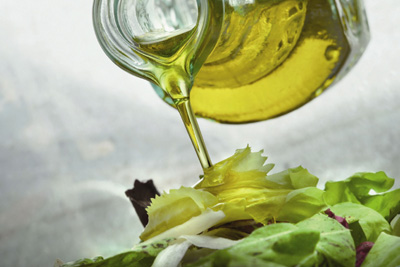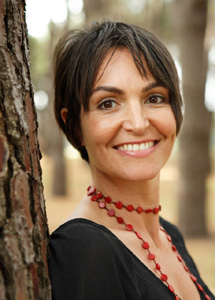Are you a fat phobic?

Are you a fat phobic?
Surprising enough there is such a thing as good fat, not all fat necessarily equals bad fat. The supermarket shelves are full of food packages emblazoned with 'low fat' and 'fat free' messages and for many of us, healthy eating or going on a diet means simply cutting out the fat.Nutrition scientist Dr Joanna McMillan Price says that nutritional advice for health and weight control has traditionally focused on lowering fat intake: "This focus may have lead many of us to become "fat phobic", attempting to eliminate all fats from our diet, and the food industry has responded by producing low-fat and fat-free products, marketed as healthy options to their full fat originals."
The low fat phenomenon began in the late 1980s but it has done little to cut obesity rates, which have more than doubled in Australia in the past two decades. Part of the reason for this could be that people are of the mind that if they don't eat fat, they won't get fat - forgetting that high calorie, low fat foods will also hinder weight loss.
Joanna says that while it is important to monitor fat intake, cutting out all fats and replacing them with other food types, like carbohydrates, to control your weight may be in vain: "The low-fat message omits the fact that healthy fats are essential in our diet. The best approach is to concentrate on reducing harmful fats such as saturated or trans fats, while including healthy fats in moderation."
A study published in the International Journal of Obesity reported that the Mediterranean diet, which is known to comprise healthy fats, especially olive oil, was found to be more effective in helping people to lose weight and sustain weight loss than a strict low fat diet.
Joanna says that our bodies need a certain amount of good fats for us to remain healthy: "Fat provides us essential fatty acids necessary to keep our bodies working properly, as well as the fat-soluble vitamins A, D, E and K. We also need fat to absorb many antioxidants so adding a quality fat dressing, such as one based on olive oil, helps you make the most of the nutrients in your salad."
The Department of Health and Ageing healthy weight website advises people to "replace trans fats in their diet with polyunsaturated or monounsaturated fatty acids which help lower blood cholesterol levels."
One of the best home grown sources of monounsaturated fats is Australian extra virgin olive oil. "It cannot be stressed enough what a positive effect olive oil has on the body, particularly extra virgin olive oil, which can be used in place of butter or other oils, known to be higher in saturated fat", adds Joanna.
There is a consistent body of scientific evidence that states that diets rich in monounsaturated fats and antioxidants, present in extra virgin olive oil, are associated with lower levels of 'bad' cholesterol, reduced blood pressure and reduced oxidative stress on the body resulting in a lower risk of some cancers.
Australian extra virgin olive oil is extracted from the fruit without the use of chemicals or excessive heat. As well as being a 'good fat', Australian extra virgin olive oil has high levels of beneficial polyphenol antioxidants and monounsaturated oleic acid, which have a positive impact on health, and is renowned for its unique very low level of saturated palmitic acid.
 Joanna's tips on good and bad fats:
Joanna's tips on good and bad fats:Fats to reduce:
Saturated fats: Butter, full fat dairy products (e.g. whole milk, cheese, cream and ice-cream), animal fat (e.g. visible fat on meat, bacon and poultry), biscuits and cakes, pastries and pies, palm oil.
Trans fats: Commercial biscuits, cakes, pastries and fast food.
Good fats to include in moderation
Monounsaturated fats: Extra virgin olive oil (choose Australian), avocado, many nuts, (almonds, macadamias, cashews, pecans, pistachios, hazelnuts & peanuts) peanut butter and unrefined peanut oil.
Omega-6 Polyunsaturated fats: Sunflower oil, soy bean oil, seeds and seed oils, nuts (e.g. brazil, pine and walnuts).
Omega-3 Polyunsaturated fats: Oily fish (e.g. salmon, trout, sardines, mackerel, herring, tuna), flaxseed oil, omega-3 enriched eggs, seaweed.
The Australian Olive Association was founded in 1995 as the industry body to encourage research and dissemination of information and the sustained development of a national olive industry in Australia. The Association has launched the Australian Extra Virgin brand to raise awareness and educate consumers about the health benefits, freshness and quality of Australian extra virgin olive oil. For more information on the Australian Olive Association, please visit www.australianolives.com.au. For more information on Australian Extra Virgin Olive Oil, visit www.australianolives.com.au
Interview with Joanna McMillan Price
Are you a fat phobic? Do you know the difference between good fats and bad fats? Is there such thing as a good fat? Nutritionist Joanna McMillian Price explains the difference between good and bad fats and why fat doesn't necessarily equal bad. Have Australians become fat-phobic?Joanna McMillan Price: Many of them have - they assume eating fat makes you fat and so are terrified to use too much olive oil and other healthy fats. Ironically where the fats are hidden they find it easier to forget they are there - so still eat fast food, biscuits cakes etc!
What foods do we need to avoid in order to lose body fat?
Joanna McMillan Price: Highly processed carbs such as those made from refined white flour, foods high in saturated and/or trans fats and modern manufactured foods that have unnaturally high energy densities and over flavourings that tend to make us eat more of them.
What fats do we need to ensure we still consume when on a diet?
Joanna McMillan Price: Monounsaturated fats such as those found in Australian extra virgin olive oil, avocado and many nuts should be the major fats in the diet, then we need more omega-3 fats from oily fish and seafood (short chain omega-3s also in flaxseed and walnuts) and then a few other polyunsaturates from other plant foods such as seeds.
If we consume too many foods with 'good fat' can it turn to 'bad fat'?
Joanna McMillan Price: No. But if you eat too much you're eating a lot of calories that may be hard to burn off.
If a product says 'fat free', 'reduced salt' or even 'reduced fat' is it always better to choose this product over others?
Joanna McMillan Price: Not necessarily and in fact I dislike many of these products. I advise people to eat more food in as close to it's natural state as possible rather than eat a whole host of modified foods. Certainly eating less salt is necessary but if you steer away from processed foods you can do that.
What everyday items, that contain bad fats, can we change to products that are less in fat or have good fats?
Joanna McMillan Price: I buy low fat or skim milk to cut down on saturated fats, but with most other foods I buy healthy fats in place of bad fats. So I use Australian extra virgin olive oil in place of butter, I buy nuts and seeds and nut paste instead of processed snacks, I choose lean meats and oily fish etc.
Are we what we eat? So, if we eat a lot of fat, do we ultimately become fat?
Joanna McMillan Price: Well only if you are overeating - too many kilojoules from whatever source will ultimately make you fat as those kilojoules have to go somewhere. But if you're eating in balance fat will not turn to body fat.
If we are craving a high fat food, like fried chips, what can we have to cure that craving?
Joanna McMillan Price: First up have less of the food - having a food habitually actually makes you want it more. It becomes more of a habit than a craving. But when you do have a craving think about whether you really want it and when you feel strongly that you do have a little but tell yourself you can have it again tomorrow if you want. That way you won't binge and over time you can wean yourself off the food as you will realise there are times when the craving was less strong. You can also think about making healthier versions of such foods - make homemade oven baked chips drizzled with some extra virgin olive oil for example. The more good food you eat the less likely you will want to eat the bad stuff.
How can we get through parties and events without consuming bad fat foods?
Joanna McMillan Price: Never go to a party ravenous - always have a healthy meal or snack beforehand so you are not relying on the food available. Avoid the party pies and chips - make the healthiest choices available or just have a small taste.
MORE



